|
|
|
|
On September 11 2001, I was staying with friends in Brooklyn, having arrived in New York the day before to spend a week en route from the UK to Australia. I was buying coffees at a cafe on Union Street when the barista making the drinks gasped and told me he’d just seen an aircraft fly into the World Trade Center. My friends were both also reporters, so we raced into Manhattan on the subway to get closer to the burning buildings. At 14th Street station the subway train stopped and we were told to get out. We emerged on to the street in time to watch the second building collapse in a huge cloud of thick smoke and rubble. It’s a sight I will never forget.
The next two weeks were among the most emotionally demanding of my career, a series of gut-wrenching interviews with the families of victims and doctors overcome with stress and horror. Nothing, we were told, would be the same again. The world had changed.
But had it really? In his book, Losing Control, published two years before the attacks, Paul Rogers – a scholar of international security at Bradford University – had already identified a trend that had largely emerged after the end of the cold war. This was the increasing ability of the weak to take up arms against the strong, which manifested itself at regular intervals in the 1990s through organised terrorist attacks. Here he writes that the world’s leaders still have to learn lessons from this and redefine what they think of as global security.
It doesn’t help, of course, that politicians and the media insist on framing terrorism largely as a problem with Islam. Even when terrorist events take place in Islamic countries, they are more likely to be motivated by ethno-nationalist causes. Nor does it help that Hollywood regularly reinforces that trope.
But there can be little doubt that the west’s declaration of a “war on terror” and its invasions of Afghanistan and Iraq have perpetuated violence across the Islamic world. Al-Qaida, the group behind 9/11, has largely been eradicated, but recent events in Afghanistan are a reminder that violent jihad remains a potent force.
Twenty years on, what was Ground Zero on the site of the World Trade Center has now been rebuilt. Here is the fascinating story about what became of the remains of the buildings that burned on that terrible day in September 2001.
This week we also hailed the return of beavers to the UK’s wild spaces, wondered what sort of people are Abba fans, and felt grateful for a new study that might mean we don’t have to walk as far to keep fit.
From our colleagues around the world, a unique fungi that could help solve the problem of antibiotic resistance, what lies behind the recent coup in Guinea and a look forward to the Canadian election on September 20.
Do try and find time to listen to The Conversation Weekly podcast. This week’s episode is about the recent earthquake in Haiti. And if you’re looking for more audio, check out our latest selection of narrated articles.
|

|
Jonathan Este
Associate Editor, International Affairs Editor
|
|
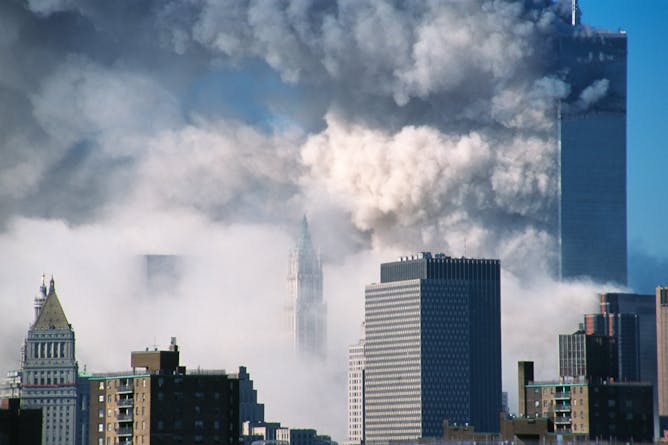
Paul Rogers, University of Bradford
It was the day the US realised it was fighting a different kind of war.
|
|
|
-
Jared Ahmad, University of Sheffield
Most terrorism has nothing to do with Islam, yet thanks to 9/11 politicians and the media, that’s the way it is presented to the public.
|
|
|
|
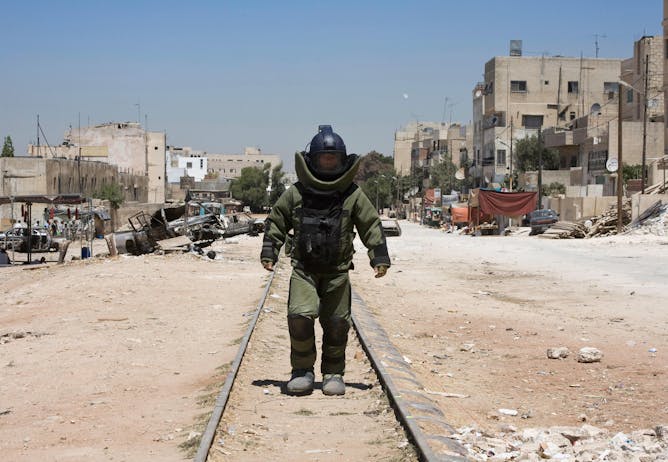
Jeremy Renner in The Hurt Locker.
Alamy
Maria Flood, University of Liverpool; Michael C. Frank, University of Zurich
In a time of increasingly complex geopolitical entanglements and moral failings, these films articulate a yearning for unsullied heroism, effective leadership and appropriate responses to crises.
|
|
|
-
Christina Hellmich, University of Reading
The terrorist group behind the 9/11 attacks has been replaced by other jihadist threats.
-
Michael Picard, University of Edinburgh
What happened to the debris and human remains from the ruins of the World Trade Center?
-
David Oswald, RMIT University; Erica Kuligowski, RMIT University; Kate Nguyen, RMIT University
The World Trade Center buildings were built to withstand wind loads more than 30 times the aircrafts’ weight.
|
|
|
|
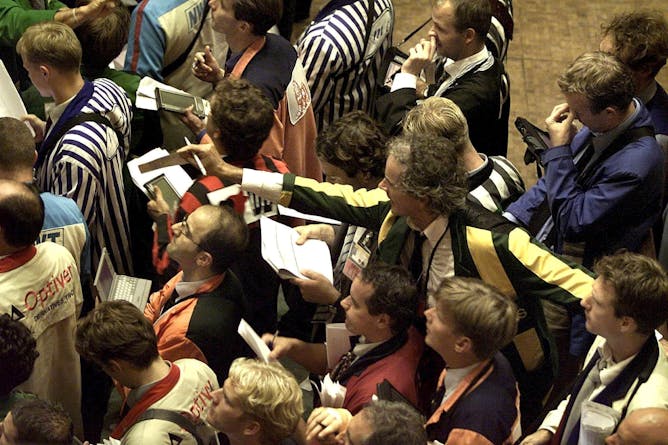
Traders in action in the hours after the attack on the World Trade Center.
EPA
Alexis Stenfors, University of Portsmouth
Some traders were panicking to lose positions that now looked hopelessly exposed, while others were trying to make the most of the opportunity.
|
|
|
-
Ian Pace, City, University of London
There is a lot of classical music written in response to the terrible events of 9/11, however, not all of it should have been written.
|
|
|
|
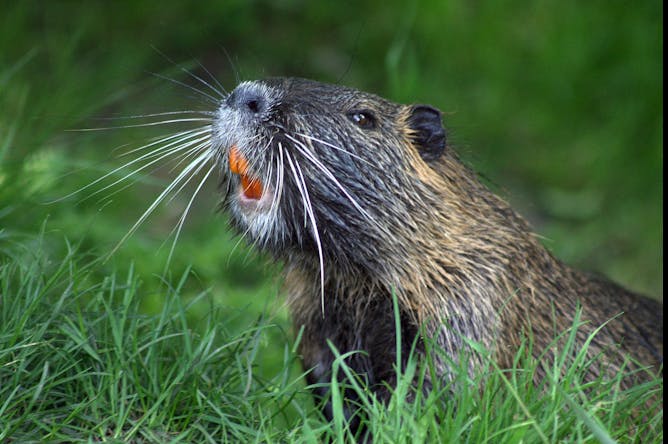
Introducing beavers into wild areas of England could assist with rewilding efforts.
Elli60/Pixabay
Joshua Larsen, University of Birmingham; Annegret Larsen
Wild beaver populations have the potential to significantly alter our landscapes, affecting biodiversity, water quality and pollution.
|
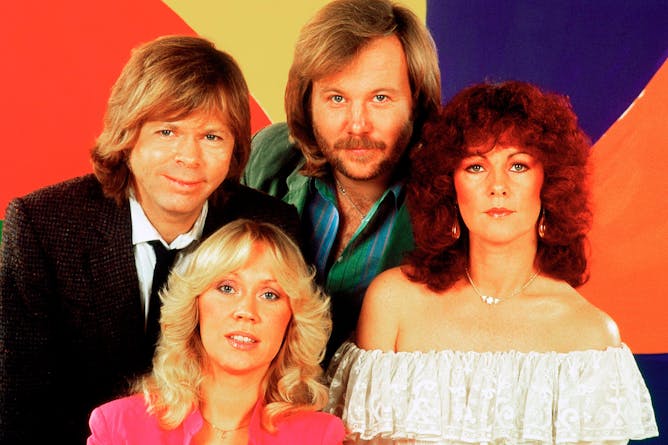
Abba had previously been voted the band the British public would most like to see reunited.
Alamy
Shanika Ranasinghe, Royal Holloway University of London
Abba’s most devoted fans have helped them remain in the public consciousness. Sometimes, under difficult circumstances.
|

Kaspars Grinvalds/Shutterstock
Lindsay Bottoms, University of Hertfordshire
A new study finds huge benefit in taking just 7,000 steps a day. Which may come as a relief to those who never quite make it to 10,000.
|
|
|
-
Siouxsie Wiles, University of Auckland
Penicillin originally came from a fungus, and with thousands of fungi to explore, Aotearoa New Zealand has a potential treasure trove of bacteria-killing compounds.
-
Susanna Fioratta, Bryn Mawr
Guineans have experienced military rule before, and they know that the consequences can be dangerous.
-
Eugene Lang, Queen's University, Ontario
Leader’s debates are perhaps the most over-rated, media-hyped and uber-analyzed events in politics, though they rarely have a meaningful impact on electoral outcomes.
|
|
| |
Featured events
|

|
20 Bedford Way , London , London, City of, WC1H 0AL , United Kingdom of Great Britain and Northern Ireland — UCL
|

|
Lancaster University, Lancaster , Lancashire, LA1 4YW, United Kingdom of Great Britain and Northern Ireland — Lancaster University
|

|
King's College, Aberdeen, Aberdeenshire, AB24 3FX, United Kingdom of Great Britain and Northern Ireland — University of Aberdeen
|

|
Online, Southampton, Southampton, SO17 1BJ, United Kingdom of Great Britain and Northern Ireland — University of Southampton
|
|
|
|
| |
| |
| |
| |
| |
|
|
|
|
|
|
|